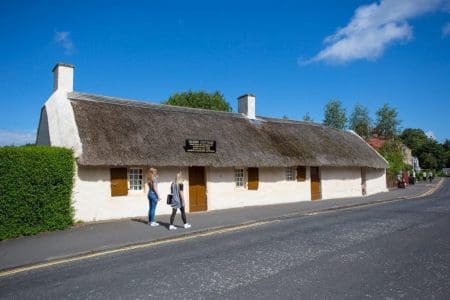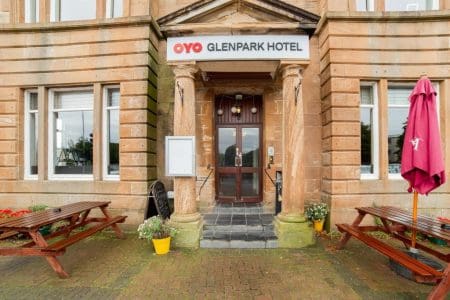There may not be anything so wondrous as to look up to see a clear sky full of stars. In addition, seeing the Northern Lights is on many a travel bucket list. Luckily for travellers in search of stars and the Aurora Borealis, Scotland has some of the largest expanses of dark sky in Europe making it a perfect destination for eager stargazers.
Scotland lies at the same latitude as Stavanger in Norway and Nunivak Island in Alaska, which means a visit there is as likely to bring a spotting of the Northern Lights as other destinations. And with the colder, darker nights drawing in, it is the perfect time to get cosy up north and (hopefully) experience the auroral displays.
From Dumfries and Galloway in the south, to the coast of Aberdeenshire further north, to the country’s islands & Highlands, to Scotland’s cities – a dazzling trip to Scotland is not too far away.
The Northern Lights
Head to Aberdeenshire and the Moray coast, where there are plenty of clear skies and limited pollution (essential for a chance to spot the light displays). Visit Rattray Head Lighthouse or Cullykhan Bay near Fraserburgh, or Cullen Bay.
Located over 100 miles north of the Scottish mainland, Shetland is also a magical place from which to potentially get a glimpse of the Northern Lights (known locally in Shetland as the ‘Mirrie Dancers’). Stay in a lighthouse or take to Eshaness for the majestic views and history.
Visitors to Scotland’s towns and cities may also be in with a chance with seeing the lights, with the potential to spot from Calton Hill or Arthur’s Seat in Edinburgh, or along towards Angus and Dundee, if the aurora is very strong. Fife and St Andrews has also had its share of auroral displays on a clear night in the autumn and winter.
Star light, star bright
The best time to go stargazing is when there is no bright moon at night and when the sun has set enough so that twilight does not affect observations. Locations identified as ‘Dark Sky Sites’ are only dark during these times, equating to about two weeks every lunar month. Some of the best places to go stargazing in Scotland include:
Dumfries & Galloway, home to Galloway Forest Park, which has glens, lochs and some of the highest hills in southern Scotland. With so few buildings and very limited light pollution it was a natural choice to be the first Dark Sky Park to be named as such in the UK. A visit to the Scottish Dark Sky Observatory is a must, as is meeting with a Dark Sky Ranger at one of the visitor centres. Also head to Moffat, the UK’s first Dark Sky Town.
With the high quality of the night skies, the Tomintoul & Glenlivet – Cairngorms Dark Sky Park became Scotland’s second international Dark Sky Park.
North West Sutherland, between Kylesku and Inchnadamph, is one of the darkest sky locations in the UK and possibly Europe, ideal for taking in the wonder of the dark skies above.
The Outer Hebrides has some of the darkest skies in the whole of the UK. Many astronomical sights can be seen through the naked eye including the Orion Nebula (over 1,500 light years away), the Milky Way Galaxy, and one of the Milky Way’s companion galaxies the Great Andromeda Galaxy. The Northern Lights, Aurora Borealis, can also be seen from the islands, one of the very best spots in the UK for watching this incredible phenomenon.
In addition, nine locations on the Isle of Skye have been officially named ‘Dark Discovery Sites’ after they were judged to be perfect spots for stargazing.
Events and tours
Coll & the Cosmos, Isle of Coll
26 & 27 October 2019
A collaboration between Coll Bunkhouse and Cosmos Planetarium, Coll & The Cosmos is a stargazing weekend break on the Isle of Coll which makes the most of the island’s incredible dark sky. The break has been specifically designed to appeal to as wide an audience as possible. No prior knowledge of astronomy is needed. A two-day astronomical voyage of discovery, with approximately 10 hours of learning and stargazing activities delivered by expert astronomers, visitors can discover the beauty of the island itself and also experience the wonders of the night sky under some of the darkest sky in Europe.
Prices: from £75 per person, see https://collbunkhouse.com/dark-skies-coll-cosmos/ for full details.
Public Astronomy Evening at the Edinburgh Royal Observatory
Various dates October 2019 – March 2020 (18:30 – 19:30 & 20:00-21:00)
Visitors can find out about the history of Edinburgh’s Royal Observatory and tour the fabulous Victorian telescope dome at one of their special Public Astronomy Evenings. These events are designed to be suitable for all ages and include stargazing should weather permit. Prior booking required. Events will involve and astronomy-related talk and stargazing and observing the skies through telescopes (weather permitting).
Cost: From £4 per person, see www.roe.ac.uk/vc/ for full details.
Coming in 2020….
Now in its second year, the Hebridean Dark Skies Festival – led by An Lanntair in partnership with Stornoway Astronomical Society, Calanais Visitor Centre, Gallan Head Community Trust, Lews Castle College and new partner Uig Sands – will bring two weeks of arts and astronomy events to the Isle of Lewis. The 2020 festival will run from Friday, 7 February to Saturday, 22 February, with an ambitious and exciting programme spanning theatre, live music, film, visual art, food, astronomy talks, and stargazing.
For more information on stargazing in Scotland, visit: www.visitscotland.com/stargazing, or for seeing the Northern Lights in Scotland, visit: www.visitscotland.com/Northernlights. Also, check out the Scotland is Out of this World Trail with links to space exploration and dark skies: www.visitscotland.com/out-of-this-world.



